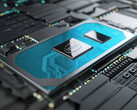Recently, we've discussed about several CPU benchmarks pertaining to the new Intel 10th gen Comet Lake-H Core i7-10875H in the Gigabyte Aero 17 HDR X8 laptop that is currently under review. Now, we shall take a preliminary look at the sustained performance of the chip. We compare the Core i7-10875H with the AMD Ryzen 9 4900HS in the Asus Zephyrus G14. Also included in this comparison are the Core i7-10750H in the Acer Predator Triton 500, which is currently under review, the 9th gen Core i9-9880H in the HP Omen 17, and the Core i7-9750H in the Schenker XMG Pro 15.
Both the Core i7-10875H and the Core i7-10750H sport the Thermal Velocity Boost feature, so this is a good chance to see how these chips perform before they start throttling. We ran Cinebench R15 Multi in a loop for at least 25 cycles. Do remember that this test is heavily influenced by the laptop's cooling and chassis design. Nevertheless, it does gives us a fair idea of what to expect from Comet Lake-H's performance under sustained load.
Intel Core i7-10875H sustained performance comparison vs AMD Ryzen 9 4900HS and Core i9-9880H
Comparing the performance of the Core i7-10875H and the Ryzen 9 4900HS presents an interesting paradigm. We see that the Core i7-10875H starts off at 1671 points, but the score starts dipping in the second round, reaching 1563 points (a 6.4% decrease) at the end of round 5. From then onwards, the CPU recoups itself and offers a decent sustained performance till about round 13 after which we see intermittent dips in the scores.
The Ryzen 9 4900HS, on the other hand, tries to maintain its peak performance between round 1 and round 5 during which we observe only a 2.7% decrease in scores. From here onwards, the performance drops by nearly 10.5% until round 9 and then stabilizes itself in this range till the remainder of the test. Given that the Ryzen 9 4900HS is TDP-capped at 35W, it may be able to demonstrate an even better sustained performance when deployed in notebooks that are thicker and with better cooling than the Zephyrus G14.
The Core i7-10875H is about 15% faster than the 9th gen Core i9-9880H when round 1 scores are compared thanks to increased boost clocks in this generation. The Core i9-9880H shows a drastic 11.5% dip in scores in round 2 itself though it remains relatively stable thereafter till the end of the test. It is very much possible that improvements to Thermal Velocity Boost and Turbo Boost 3 may have played a part in limiting the Core i7-10875H's performance drop to just half of what the Core i9-9880H had to suffer.
That being said, the Core i9-9880H in the HP Omen 17 shows an overall flatter curve without the intermittent dips. This could probably be attributed to the fact that the Omen 17 has a slightly thicker chassis (1.06 inches) compared to the Gigabyte Aero 17 HDR XB (0.8 inches), which should be able to afford better cooling.
Intel Core i7-10750H sustained performance comparison vs Core i7-9750H
A comparison of the Core i7-10750H's sustained performance in the Acer Predator Triton 500 with that of the Core i7-9750H in the Schenker XMG Pro 15 indicates a similar pattern as discussed above. Comparing round 1 scores between the Core i7-10750H and the Core i7-9750H, we observe around 11.4% performance gains in the 10th gen. Even here, we observe just a 6.2% performance dip in round 2 with the Core i7-10750H compared to the 12.62% dip with the Core i7-9750H, which further reiterates the benefits of increased boosts.
Conclusion
This preliminary Cinebench R15 Multi loop test gives us an overview of the kind of sustained performance we can expect from the 10th gen Comet Lake-H series. At the immediate outset, we observe that Intel and AMD are taking distinct approaches to offer consistent performance under load. While AMD looks to sustain maximum possible clocks in the first few rounds, Intel seems to be okay with a dip in round 2 with the hope of recuperating thereafter. We also observe that Intel Comet Lake-H chips have managed to nearly halve the performance loss incurred in the second round of the Cinebench R15 loop compared to what was seen with the 9th generation. This should translate into reduced throttling for workflows that Comet Lake-H-powered laptops cater to.
Once again, we would like to reiterate that the results of a Cinebench loop test are highly dependent on a laptop's construction, chassis design, BIOS power limits, user settings, and the overall cooling. We look forward to testing more laptops powered by Intel Comet Lake-H and AMD Ryzen 4000-H/HS as well as the 4000-U series in the days to come, which should provide us with even more insights into how well these new CPUs work under sustained load. Keep an eye out for those.
Source(s)
Own


 Deutsch
Deutsch English
English Español
Español Français
Français Italiano
Italiano Nederlands
Nederlands Polski
Polski Português
Português Русский
Русский Türkçe
Türkçe Svenska
Svenska Chinese
Chinese Magyar
Magyar














